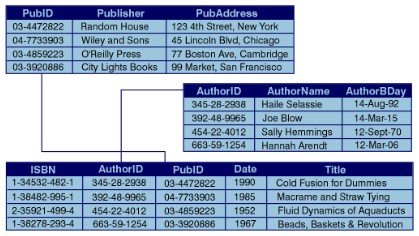Limitations of Relational Data Model
Relational model is the most commonly used model for databases. It provides a flexible capability to allow non-programmers to pose general queries quickly and easily, but it also includes the following drawbacks:
- Communication barrier.
A typical relational database performs a task by following the three steps:
- Move data from the database into the program workarea.
- Perform operations on the retrieved data.
- Move manipulated data back to database origin.

- Impedance mismatch is the difference between the type systems of the programming language and the DBMS DDL and DML.
- Inadequate type definition capabilities.
- Unable to easily represent complex data structures in more intuitive hierarchical ways.
- Poor data manipulation routines since relational systems can be classified as computationally incomplete.
- Poor modeling power/structure.
An example of relational databases is given on the right.
It is a book database including three tables: Publishers, Authors, and Books with keys PubID, AuthorID, and ISBN, respectively.
|

|
| Never argue with a fool, they will lower you to their level, and then beat you with experience. |